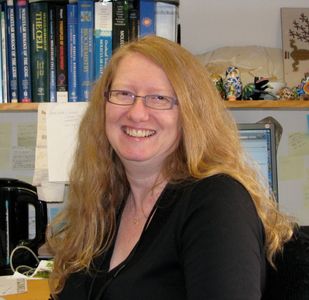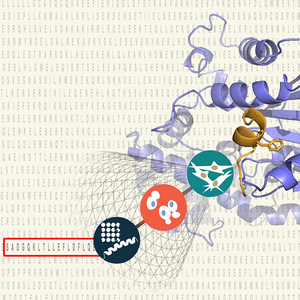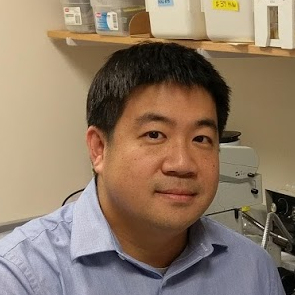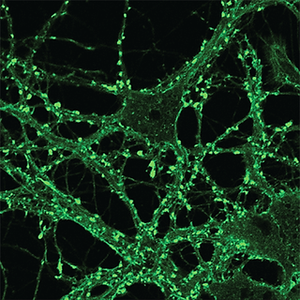Karen Symes named Educator of the Year
Dr. Karen Symes, Associate Professor of Biochemistry and Assistant Dean of Student Affairs was named "Educator of the Year" in the PhD category at the BUSM faculty meeting. Congratulations Dr. Symes.
Russek Award Winners in Biochemistry Laboratories
The Henry I. Russek Award Nominating Committee and the Russek Executive Committee would like to announce the winners of this year’s Department of Biochemistry awards. The honorable mention was awarded to Deborah Chang who is a student in Dr. Zaia’s lab, second prize was awarded to Julia Hicks-Berthet who is a student in Dr. Varelas's lab and the first prize was awarded to Elena Stampouloglou, who is a student in Dr. Varelas's lab. There is more great news for our department! The first prize awardee for the Molecular & Translational Medicine program is Rekha Raghunathan, a student in Dr. Zaia’s lab and the first prize awardee for the Genetics & Genomics program is Stefanie Chan, a student in Dr. Perissi’s lab. Congratulations to all of the awardees (and their mentors)!
So, we'll see you all this Friday, April 26th in Hiebert Lounge for Henry I. Russek Student Achievement Day 2019 and the keynote address to be delivered by Dr. Xiowei Zhuang; her talk is entitled “Illuminating Biology at the Nanoscale and Systems Scale by Imaging”.
Dr. Abraham’s research in NYT article
Research on Klotho and Alzheimer's from Dr. Carmela Abraham's lab and Dr. Abraham's former trainee, Gwendolyn King, was mentioned in a New York Times article: "Turbocharge your brain".
Nhat Le receives Warren Alpert Distinguished Scholars Award
 Congratulations to Dr. Nhat Le, a Postdoctoral Research Associate in the Harris lab, who was recently awarded a Warren Alpert Distinguished Scholars career development award. This two-year, $400,000 fellowship will fund Nhat’s work on a project entitled “Signaling Pathways Underlying Prion Neurotoxicity”. Her project aims to identify the mechanism underlying prion-induced synaptotoxicity using genomic, proteomic and pharmacological techniques in mouse and human neurons and in animal models.
Congratulations to Dr. Nhat Le, a Postdoctoral Research Associate in the Harris lab, who was recently awarded a Warren Alpert Distinguished Scholars career development award. This two-year, $400,000 fellowship will fund Nhat’s work on a project entitled “Signaling Pathways Underlying Prion Neurotoxicity”. Her project aims to identify the mechanism underlying prion-induced synaptotoxicity using genomic, proteomic and pharmacological techniques in mouse and human neurons and in animal models.
Dr. Costello receives HUPO 2019 Lifetime achievement award
Catherine Costello Receives Lifetime Achievement in Proteomics Award
Catherine Costello, PhD, the William Fairfield Warren Distinguished Professor at Boston University School of Medicine (BUSM), has received the 2019 Lifetime Achievement in Proteomics Award from the U.S. Human Proteome Organization (U.S. HUPO). This inaugural award recognizes a career of discovery that has made a lasting impact in the field of proteomics, the field which explores the distribution, dynamics and modifications of proteins in cells and living organisms and their relationships to health and disease. ... (link)
G-protein discoveries
The Garcia-Marcos lab has recently published two studies in the Journal of Biological  Chemistry on the topic of heterotrimeric G protein signaling. Marcin Maziarz, a postdoctoral fellow in the Garcia-Marcos lab, is the first author in both of them. The first study, which was selected as an Editors’ Pick, describes a novel pipeline for the discovery and validation of G protein activators that are not GPCRs, which are the “classic” G protein activators. By screening candidate cytoplasmic proteins containing a putative Gα-binding-and-activating (GBA) motif and using various in vitro and cell-based assays, the lab identified PLCδ4b as a new non-receptor G protein activator.
Chemistry on the topic of heterotrimeric G protein signaling. Marcin Maziarz, a postdoctoral fellow in the Garcia-Marcos lab, is the first author in both of them. The first study, which was selected as an Editors’ Pick, describes a novel pipeline for the discovery and validation of G protein activators that are not GPCRs, which are the “classic” G protein activators. By screening candidate cytoplasmic proteins containing a putative Gα-binding-and-activating (GBA) motif and using various in vitro and cell-based assays, the lab identified PLCδ4b as a new non-receptor G protein activator.
In the second study, the lab interrogated the mechanism of action of mutant G proteins known to drive uveal melanoma, a cancer of the eye which lacks effective therapies. Interestingly, they found that one frequent mutation, Q209P in the G protein Gαq, leads to G protein activation through a unique and unanticipated mechanism that could be leveraged to develop novel therapeutics for this cancer type.
Nelson Lau named director of the Genome Science Institute
 Dean Karen Antman annouced today that Nelson Lau, PhD, has been named Director of the Genome Science Institute (GSI), effective Jan. 1, 2019. An Associate Professor of Biochemistry, Dr. Lau’s research focuses on genetic and epigenetic regulation of the genome by transposons. He came to BUSM in 2017 from Brandeis University. Prior to working at Brandeis, he was a post-doc with Robert Kingston at MGH/Harvard. He received his PhD with David Bartell at MIT/Whitehead. Please join the Department in congratulating Dr. Lau on his appointment.
Dean Karen Antman annouced today that Nelson Lau, PhD, has been named Director of the Genome Science Institute (GSI), effective Jan. 1, 2019. An Associate Professor of Biochemistry, Dr. Lau’s research focuses on genetic and epigenetic regulation of the genome by transposons. He came to BUSM in 2017 from Brandeis University. Prior to working at Brandeis, he was a post-doc with Robert Kingston at MGH/Harvard. He received his PhD with David Bartell at MIT/Whitehead. Please join the Department in congratulating Dr. Lau on his appointment.
New Research Discoveries: Prions and Synaptic Toxicity
 In a new research study from the Harris laboratory in PLOS pathogens, first author Cheng Feng and collaborators defined a new pathway mediated by the p38 MAPK signaling pathway that was important for prion synaptic toxicity. Furthermore this research identified that perturbations in the actin cytoskeleton within dendritic spines resulted in deficits in synaptic transmission.
In a new research study from the Harris laboratory in PLOS pathogens, first author Cheng Feng and collaborators defined a new pathway mediated by the p38 MAPK signaling pathway that was important for prion synaptic toxicity. Furthermore this research identified that perturbations in the actin cytoskeleton within dendritic spines resulted in deficits in synaptic transmission.
This study has received significant press coverage and appeared on the cover of PLOS pathogens.
Congratulations Harris lab.
Message from the Chair, September 2018
In a new "Message from the Chair" Dr. David Harris describes the exciting, new developments in the Department.
New Faculty Positions
GENETICS, GENOMICS, CELL BIOLOGY
The Department of Biochemistry at Boston University School of Medicine, in collaboration with the Genome Science Institute, is undertaking a major expansion in the areas of genetics and genomics, including the application of genetic/genomic techniques to key problems in cell biology. We invite applications at the Assistant, Associate, and Full Professor levels. Several positions are available, and these will be highly competitive with regard to start-up funds, space, and salary.
We are interested in creative scientists working in a broad range of research areas, including, but are not limited to, chromatin structure and function, epigenetics, RNA biology, single-cell genomics, metabolic regulation, control of gene expression, DNA damage and repair, stem cells/development, and cancer genomics. We welcome applications from individuals utilizing genetically tractable model organisms, novel computational/bioinformatic approaches, and functional genomic methods (e.g., CRISPR/Cas screening) to address significant cell biological problems. The position requires a Ph.D. or M.D., and relevant postdoctoral experience.
Over the past several years, the Department of Biochemistry has enjoyed a major transformation in its personnel and infrastructure, including hiring of eight new faculty members at all levels, renovation of 35,000 square feet of research space, and establishment of a new Center for Network Systems Biology focused on proteomics and protein interaction networks. These changes have dramatically expanded the scope of our research efforts beyond those of a traditional biochemistry department, to include “big data” approaches (genomics, proteomics), studies of non-coding RNAs, and use of new model organisms (zebrafish, C. elegans, Xenopus, Drosophila). The department has long-standing strengths in the areas of metabolism, obesity, and diabetes, and virtually every faculty member does work with important translational applications. The department now encompasses six thematic research concentrations: Development, Cell Biology, Genomics, Neuroscience, Metabolism, and Proteomics/Glycomics.
Applicants should submit a cover letter, curriculum vitae, statement of research interests, and list of publications through Academic Jobs Online.
Candidates at the Assistant Professor level should provide a minimum of three letters of recommendation at the time of application. Applications will be reviewed on a rolling basis, but should be submitted by October 31, 2018 for full consideration. Please direct email queries to biochem@bu.edu.
Boston University is an equal opportunity and affirmative action employer.